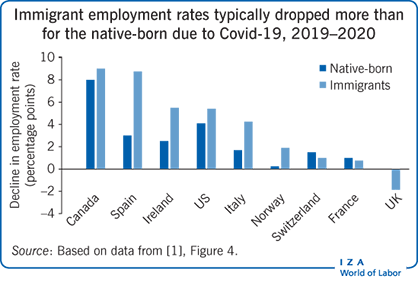Elevator pitch
The labor market disruptions due to the Covid-19 pandemic and lockdowns impacted immigrant workers more severely than native-born workers in the US, Canada, Australia, and most EU countries. Immigrant workers in most of these countries were more vulnerable to the pandemic since they were more likely to be employed in jobs that are not as easy to perform remotely. The labor market recovery for both groups in the US was rapid, and by Fall 2020, the employment gaps between immigrant and native-born workers, both for men and women, had returned to pre-pandemic levels.
Key findings
Pros
Many workers, including immigrants and native-born, were able to successfully continue working from home during the pandemic.
Rapid employment recovery was experienced by natives, but especially by immigrants, in the US and Canada in the months following April 2020.
Work arrangements such as short-time work schemes more common in the EU likely mitigated job loss, especially for immigrants.
No evidence of racial bias in employment loss due to the pandemic was observed in the US.
Cons
Immigrants suffered significantly larger employment declines than the native-born in the early stages of the pandemic in most developed, immigrant-receiving countries.
Lower job remotability of immigrants left them vulnerable to job loss in the early stages of the pandemic.
Immigrants in the US, especially men, faced more difficulty searching for employment due to the pandemic than the native-born.
Immigrants in most developed countries will remain more susceptible to future lockdowns due to their employment in less-remotable occupations.
